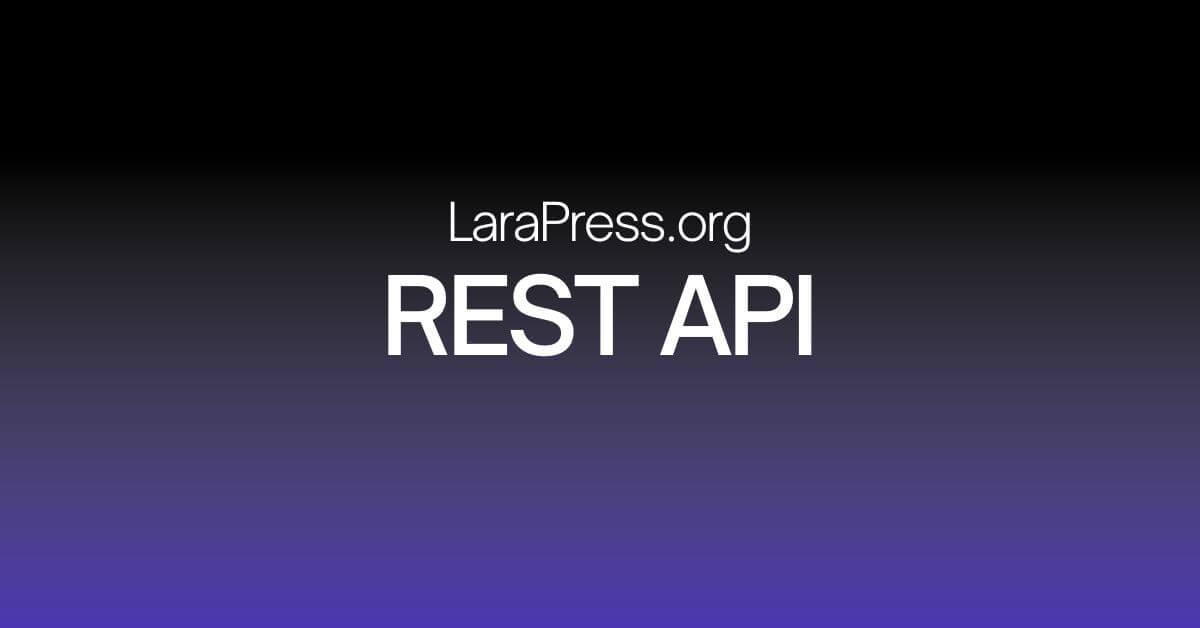
As the web evolves, developers demand more flexibility, interoperability, and performance from the content management systems they use. One of the most critical features that modern CMS platforms must offer is robust REST API support. That’s why LaraPress CMS, built on the powerful Laravel framework, includes comprehensive REST API capabilities out of the box.
In this post, we’ll explore what REST APIs are, why they matter in content management systems, and how LaraPress.org has implemented REST API support to empower developers and users alike.
REST (Representational State Transfer) is an architectural style for designing networked applications. A REST API allows different software systems to communicate with each other over HTTP in a standardized way.
When applied to a CMS, a REST API lets you:
Access and manipulate content (posts, pages, media, etc.)
Integrate with mobile apps or frontend frameworks like React or Vue
Automate workflows through third-party tools or custom applications
With REST APIs, your CMS is no longer just a backend dashboard—it becomes a powerful content engine.
Here are just a few benefits of having REST API support in a CMS like LaraPress:
Frontend Flexibility
Use your favorite frontend framework or build mobile apps that communicate directly with LaraPress via the API.
Third-party Integration
Easily connect with services like Zapier, Slack, analytics platforms, CRMs, or even e-commerce tools.
Automation & Scalability
Automate content updates, user management, and data exports without manual work.
Headless CMS Architecture
Want a decoupled or headless setup? REST APIs make it easy to serve content anywhere—from smart TVs to IoT devices.
LaraPress leverages Laravel’s robust API tools to offer developers a complete RESTful experience. Here’s what makes it powerful and easy to use:
LaraPress includes ready-to-use API endpoints for:
Posts and pages (create, read, update, delete)
Categories and tags
Users and roles
Media uploads and attachments
Each endpoint is structured using industry standards (JSON, HTTP verbs) to ensure compatibility and predictability.
LaraPress supports API tokens and OAuth2 (via Laravel Passport) to secure all endpoints. You can restrict access by user role or permission, ensuring that only authorized apps and users can interact with your data.
Developers can extend the API by adding custom routes directly within their LaraPress plugins or Laravel modules. This gives teams full control over their application’s architecture without fighting the core system.
To ensure backward compatibility, LaraPress follows a versioning system (e.g., /api/v1/posts). This is crucial for long-term projects and enterprise-grade applications.
Here are some examples of how developers are using the REST API in LaraPress CMS:
Single Page Applications (SPAs): Serve content to Vue.js or React frontends using JSON from the REST API.
Mobile Apps: Allow iOS or Android apps to fetch user data, submit forms, or browse blog content directly.
Headless Commerce: Integrate LaraPress content with e-commerce backends like Laravel-based carts or external payment APIs.
Chatbots or Voice Assistants: Deliver content dynamically to chatbot platforms using RESTful endpoints.
LaraPress’s REST API features follow clean coding standards, proper security practices, and privacy compliance. There’s no scraping, keyword stuffing, or unsafe access—making it a strong choice for sites looking to comply with Google AdSense policies and modern web standards.
REST API support in LaraPress CMS turns your website into a flexible platform ready for the demands of modern development. Whether you're building a mobile app, a headless site, or integrating with third-party tools, LaraPress gives you the tools you need—with clean code, secure access, and developer-first architecture.
If you're ready to take your content beyond the browser and into the future, LaraPress.org is the CMS to build on.